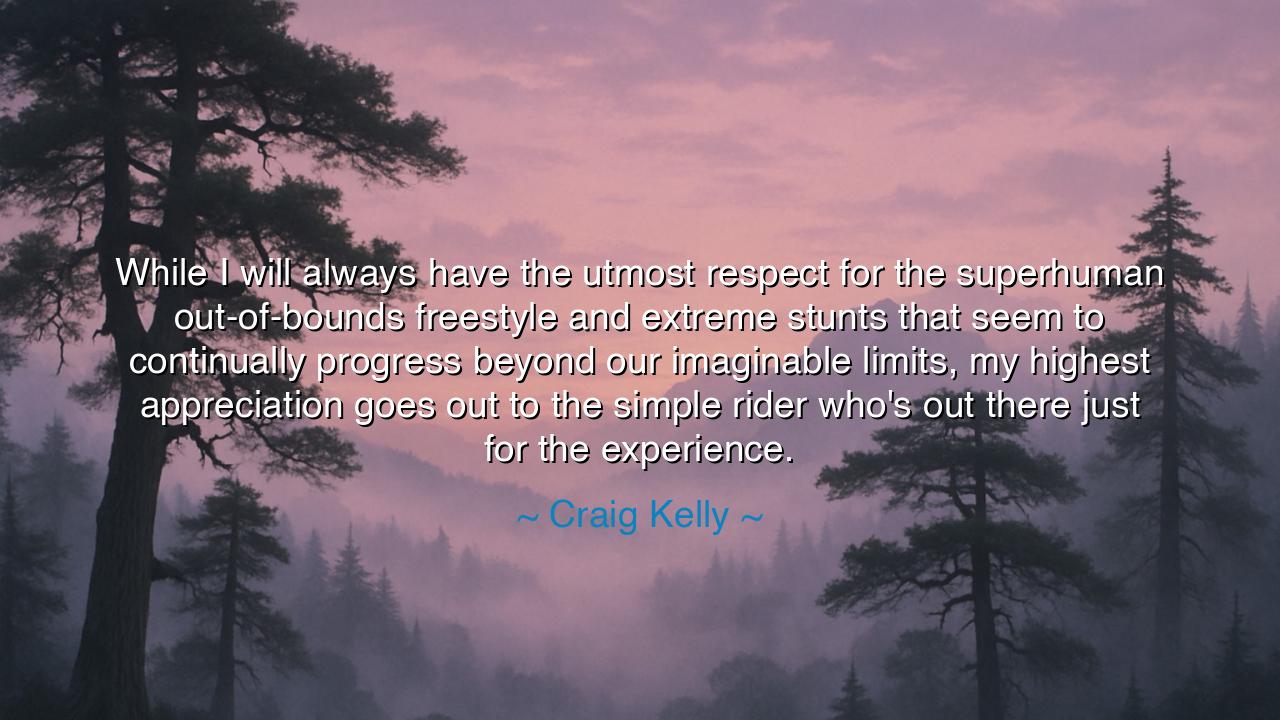
While I will always have the utmost respect for the superhuman
While I will always have the utmost respect for the superhuman out-of-bounds freestyle and extreme stunts that seem to continually progress beyond our imaginable limits, my highest appreciation goes out to the simple rider who's out there just for the experience.






"While I will always have the utmost respect for the superhuman out-of-bounds freestyle and extreme stunts that seem to continually progress beyond our imaginable limits, my highest appreciation goes out to the simple rider who's out there just for the experience." These words from Craig Kelly reflect a deep truth about the nature of pursuits and achievement. While the thrill of extreme sports and pushing human limits is undeniably inspiring, Kelly’s focus is on the essence of experience—the simple joy of being in the moment, not for the accolades or recognition, but for the personal connection to the act itself. His admiration for the simple rider speaks to a much larger lesson about living and appreciating life for its inherent beauty, rather than for the status or glory it may bring.
In the ancient world, philosophers often debated what it meant to live a good life. For Aristotle, true happiness and fulfillment came not from the pursuit of external recognition or wealth, but from living a life of virtue—a life where the act itself, the process of striving and engaging with the world, was its own reward. The Stoics, too, advocated for a life of contentment in the present moment, valuing inner peace over external achievement. In Craig Kelly’s words, there is a deep resonance with these ancient teachings: the true value of a sport, a passion, or a pursuit is not in the stunts or the fame it might bring, but in the experience itself—the freedom, the joy, the connection to something greater than ourselves.
The simple rider, as Kelly puts it, represents those who engage in life and sport not as a means to prove something to others but as a way to connect with themselves. This idea is echoed throughout history, from the ancient Olympians, who competed not just for glory, but for the honor of representing their city-states and their personal discipline, to the Romantic poets like William Wordsworth, who found deep fulfillment in the simple pleasures of nature and solitude. Wordsworth’s reflections on nature speak to a connection with the world that is not driven by ambition but by a deep, personal appreciation for the present moment. It is this appreciation that Kelly admires in the simple rider: the pursuit of something for its own sake, not for external praise.
Consider the Zen tradition, which emphasizes mindfulness and the art of being fully present in whatever task one is doing, whether it be meditating, preparing food, or even sweeping the floor. The Zen master doesn’t seek recognition; they are simply engaged in the moment, finding deep meaning and satisfaction in the act itself. This philosophy mirrors Kelly’s words. The simple rider, like the Zen practitioner, is not concerned with external feats or conquering mountains for the sake of recognition. Rather, they ride for the pure joy of the experience, for the feeling of the wind, the rush of freedom, and the sense of peace that comes from simply being in the flow of life.
While the superhuman feats of extreme athletes inspire awe, they can sometimes overshadow the deeper connection to the activity itself. Kelly’s perspective acknowledges that the pursuit of the extraordinary is, of course, valuable and exciting, but it is the everyday engagement—the act of riding for the sake of the experience—that holds a unique and profound value. This is similar to the philosophy espoused by Confucius, who believed that true wisdom and growth came not from showing off one’s abilities but from embracing the journey of life with humility and respect. Confucius taught that the right actions, performed with sincerity and mindfulness, were more important than seeking fame or external rewards.
The lesson in Kelly’s words is not only about sport but about how we approach all of life. Are we constantly chasing recognition or accolades? Do we measure our worth by the size of our achievements, or are we able to find joy in the process itself? Just as the simple rider embraces the journey over the destination, so too must we learn to find peace and fulfillment in the moment. The ultimate measure of a life well-lived is not in the heights we reach or the fame we gain, but in the authenticity and satisfaction of the experiences we embrace along the way.
In our own lives, let us seek to engage fully with the activities we love, whether it be work, relationships, or hobbies, not as a means to gain recognition, but for the joy they bring. Let us learn from the simple rider, who rides not to conquer the world but to be one with it. In every task, may we find the peace of the moment, the satisfaction of simply doing, and the fulfillment that comes from the journey itself, rather than the final destination. Just as Craig Kelly respects the simple rider, let us honor those moments in our lives that offer us the opportunity to connect deeply with ourselves and the world around us, in a way that transcends the need for external validation.






AAdministratorAdministrator
Welcome, honored guests. Please leave a comment, we will respond soon